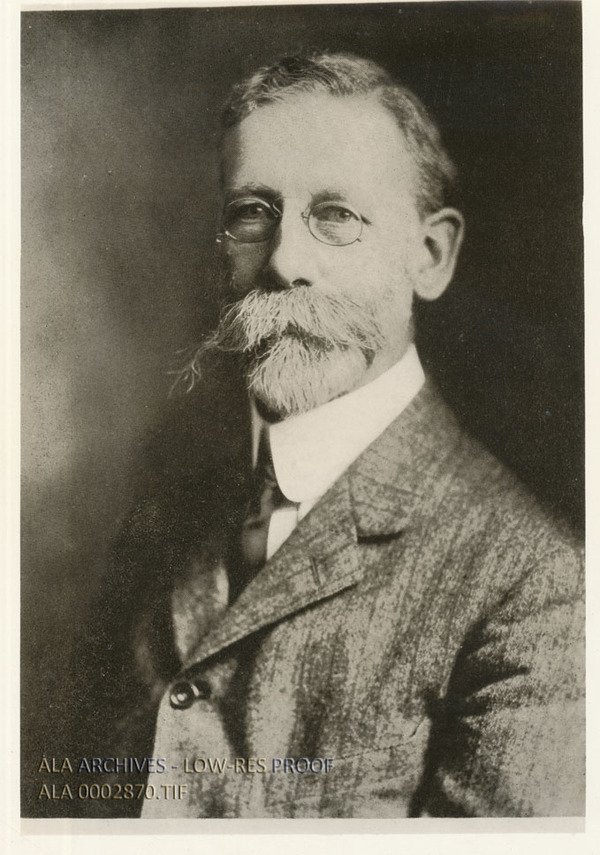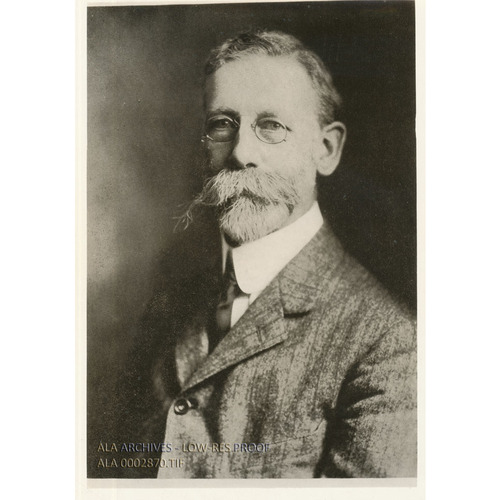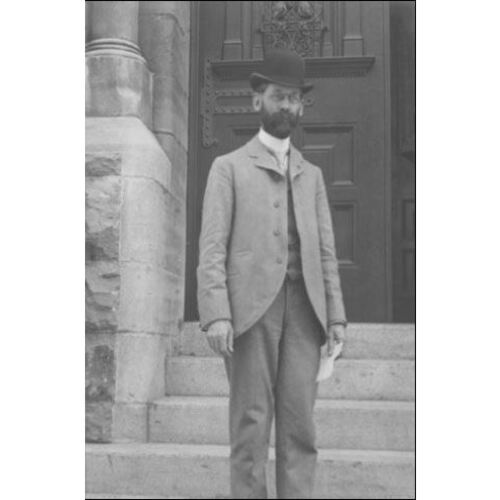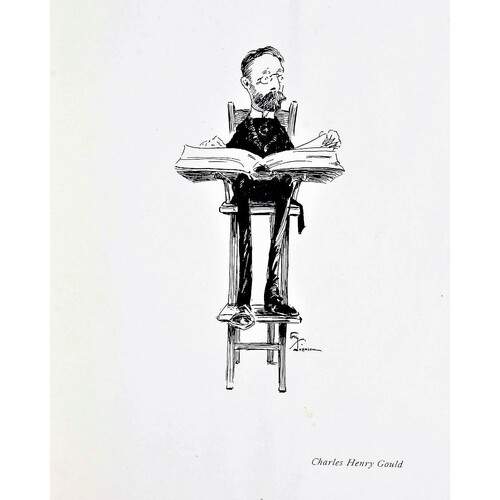
Source: Link
GOULD, CHARLES HENRY, musician and librarian; b. 6 Dec. 1855 in Groveton, N.H., son of Joseph Gould and Abigail De Witt; d. unmarried 30 July 1919 in Montreal.
The Goulds and De Witts [see Jacob De Witt*] were American families that had settled in Montreal in the early 19th century. Charles Gould attended the High School of Montreal and McGill College; he obtained a ba in 1877 and won the Henry Chapman Gold Medal in classics. He began graduate work in physics but did not receive a degree. From 1880 to 1887 he was organist at the American Presbyterian Church in Montreal, at an annual salary of $500, in succession to his father, Joseph Gould, considered Montreal’s leading English-speaking musician. He also appears to have worked at the flour-milling business founded by his grandfather Ira Gould.
Although the exact reasons he obtained the post remain unclear, Gould’s appointment on 24 June 1892 as the first university librarian at McGill University would seem to have been related to his business experience, his educational and cultural background, and the Presbyterianism he shared with the university’s principal, Sir John William Dawson*, and with the library’s great benefactor, Peter Redpath. After spending the first year of his tenure travelling through Europe and the United States learning the latest methods of library administration, he assumed office two months before the formal opening of the Redpath Library on 31 Oct. 1893 and would continue to fulfil his duties until the day before his death. He would be considered the leading Canadian librarian of his day and one of the foremost in North America.
Except for the first three years of his tenure, Gould spent his career under the dynamic principalship of Sir William Peterson*, who brought to McGill the German-American approach to higher education, in which a reformed undergraduate curriculum in liberal arts was supplemented by a wide range of graduate and professional programs. A strong library was a vital element in this approach. When Gould assumed his position in 1893 the McGill libraries possessed 55,000 volumes, of which 35,000 were in the Redpath Library. By the time of his death, there were 180,000 volumes in what constituted Canada’s largest academic collection. Although finances were always a major concern and the university’s direct support was limited, Gould succeeded in adding staff, recataloguing the collection, increasing the circulation figures, and building an addition in 1901 which doubled the capacity of the stacks. This expansion was accomplished largely through gifts from Peter Redpath and his wife, Grace, who gave outstanding collections, built the library and its extension, funded its operation, and endowed it in perpetuity. Other major benefactors, such as Sir William Christopher Macdonald, provided significant gifts of money and books, and the generosity of a wide range of minor benefactors ensured that in some years as many as 90 per cent of the acquisitions came as gifts.
Gould’s contributions to Canadian culture, scholarship, and librarianship were substantial. In 1900, while hosting in Montreal the American Library Association’s annual meeting, he met with a group in his office to found the first Canadian library association, which became the Ontario Library Association. Gould would assist the OLA with advice, attendance at meetings, and addresses. Through the support of the family of the late Hugh McLennan*, he provided library service to remote areas of the country. The mailed book boxes of the McLennan Travelling Library brought culture to countless Canadians. He began the first bibliographical control system for Canadian science by supervising Canada’s contributions to the International catalogue of scientific literature . . . (254v., London, 1902–21). His reprint series, the McGill University Publications, was a progenitor of Canadian academic publishing. His single greatest contribution to Canadian librarianship was undoubtedly the introduction of library education in 1904 with a summer school which became the McGill Library School; it would be established as a sessional program in 1927 and would initiate a graduate program in 1930. The school had been preceded between 1897 and 1904 by an apprenticeship program, run by Gould.
Gould’s presence at the international level was particularly important. In July 1897 he attended the second International Library Conference in London, England, as a vice-president. He made his greatest mark in the United States, however, after joining the American Library Association in 1893. He attended most of its annual conferences, sat on many committees and chaired several, and served as its first Canadian president in 1908–9. His presidency coincided with pivotal changes in the organization which he is said to have handled adroitly: the move of the headquarters from Boston to Chicago, the adoption of a new constitution, and the creation of the permanent position of executive secretary. These changes resulted in a fundamental reorientation of the association and the triumph of some groups over others: public libraries over large academic and research libraries and the midwestern leadership over the eastern. It is generally considered that only a foreigner of Gould’s stature and diplomacy could have successfully presided over these events without having the entire association collapse. In 1912–13 he became the fourth president of the Bibliographical Society of America, which suggests his support for academic and research librarians, as opposed to public librarians who, by then, had gained control of the ALA. His three predecessors at the society had also served as presidents of the ALA, but few of his successors would hold the post.
A number of general issues occupied Gould’s attention. He argued strongly for centralized academic libraries, but found that he had no alternative to accepting branch libraries at McGill. He was an early proponent of regional libraries, which have subsequently become a characteristic element of Canadian librarianship. His greatest contribution at the international level was as the founder of the 20th-century system of interlibrary loan. In his presidential address before the ALA and in other speeches and writings he advocated the lending of publications between libraries to provide items unavailable in local institutions. In 1916 he chaired the committee of the ALA that produced the first regulations for the conduct of interlibrary loans.
In addition to being an accomplished musician, Charles Gould loved books and reading. Contemporary accounts mention his balanced personality and self-effacing modesty. He was firm but kindly, being neither austere nor easy-going. A colour drawing of him by Andrew Dickson Patterson at McGill portrays a man who was perceptive, sympathetic, and dignified.
Charles Henry Gould’s voluminous official papers are preserved in McGill Univ. Arch. (Montreal), in RG 40 (Libraries). Other collections in the archives also proved helpful in the preparation of this biography, as did McGill Univ., Board of governors, Annual report (Montreal), 1893–1919. Genealogies of the Goulds and De Witts remain in the families’ possession.
Most of Gould’s publications were short articles, frequently revised versions of speeches and addresses, that appeared in various Canadian and American journals. Notable examples are the following: “Regional libraries” and “Co-ordination, or method in co-operation: address of the president, American Library Association, Bretton Woods Conference, 1909,” Library Journal (New York), 33 (1908): 218–19 and 34 (1909): 335–40, respectively; and “McGill University library school,” Canadian Municipal Journal (Montreal), 2 (1906): 251–52.
No full-scale biography of Gould has yet been undertaken, but two helpful introductions are Ritva Makela, McGill University Library during the tenure of Charles H. Gould as university librarian, 1893–1919 ([Montreal], 1974) and P. F. McNally, “Scholar librarians: Gould, Lomer and Pennington,” Fontanus (Montreal), 1 (1988): 95–104. A number of obituaries and biographical entries are useful, including Canadian men and women of the time (Morgan; 1912), C. H. Colby, “The late C. H. Gould,” Canadian Bookman (Toronto), 1 (1919), no.4: 7–8, and Dictionary of American library biography, ed. B. S. Wynar (Littleton, Colo., 1978), 208–10. The following sources provide valuable background: Encyclopedia of library and information science, ed. Allen Kent and Harold Lancour (42v., New York, 1968–87), 17: 311–20; S. B. Frost, McGill University: for the advancement of learning (2v., Montreal, 1980–84); Basil Stuart-Stubbs et al., A survey and interpretation of the literature of interlibrary loan (Vancouver, 1975); H. B. Van Hoesen, “The Bibliographical Society of America – its leaders and activities, 1904–1939,” Biblio. Soc. of America, Papers (New York), 35 (1941): 177–202; W. A. Wiegand, “Library politics and the organization of the Bibliographical Society of America,” Journal of Library Hist. (Austin, Tex.), 21, no.1 (winter 1986): 131–57, and The politics of an emerging profession: the American Library Association, 1876–1917 (New York, 1986); and W. A. Wiegand and Dorothy Steffens, Members of the club: a look at one hundred ALA presidents (Champaign-Urbana, Ill., [1982]).
Cite This Article
Peter F. Mc Nally, “GOULD, CHARLES HENRY,” in Dictionary of Canadian Biography, vol. 14, University of Toronto/Université Laval, 2003–, accessed March 1, 2026, https://www.biographi.ca/en/bio/gould_charles_henry_14E.html.
The citation above shows the format for footnotes and endnotes according to the Chicago manual of style (16th edition). Information to be used in other citation formats:
| Permalink: | https://www.biographi.ca/en/bio/gould_charles_henry_14E.html |
| Author of Article: | Peter F. Mc Nally |
| Title of Article: | GOULD, CHARLES HENRY |
| Publication Name: | Dictionary of Canadian Biography, vol. 14 |
| Publisher: | University of Toronto/Université Laval |
| Year of publication: | 1998 |
| Year of revision: | 1998 |
| Access Date: | March 1, 2026 |





